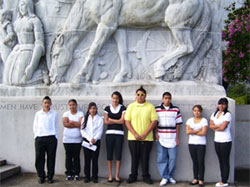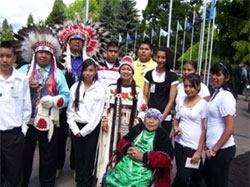
Glimpse of State Legislature
A group of American Indian youth in Oregon recently traveled to the Oregon Statehouse in Portland, where they observed lawmakers at work and attended a ceremony recognizing Federal tribes in the State—thanks to a grant through the Tribal Youth Program (TYP).

Eight TYP youth where selected to participate in the State Capital House of Representatives Page Program at the Oregon Statehouse. This was the first American Indian group in the State of Oregon to take part in the program.

TYP youth attending Tribal Day, an event that featured nine federally recognized tribes in the State of Oregon.
To participate in the Page Program, the youth had to apply for 1-day internships. Of the 15 applicants from the Warm Springs Reservation, 8 were accepted. Their trip coincided with Tribal Day, an event that featured nine federally recognized tribes; the participants were able to meet one of the tribal chiefs, Chief Joe Moses.
For most of the youth, this was their first time in a big city, as Warm Springs, OR, is more than 100 miles from Portland. Also, the program required the participants to wear professional dress clothes, which many of the tribal youth had never purchased. In addition, the State legislative sessions are completely different than the tribal government sessions the youth had attended.
The Confederated Tribes of Warm Springs Reservation in Warm Springs, OR, received a 4-year TYP grant in 2007. The program serves about 70 youth on a reservation of more than 4,560 people. In addition to providing tutoring services, the program provides participants a connection to their tribal heritage and teaches them cultural activities such as preparing traditional tribal food.
Tribal Initiatives To Implement "Green Technologies"
Solicitations for two recently announced initiatives specifically sought service providers to implement "green technologies" and provide training and technical assistance on these activities to tribes. The solicitations—the OJJDP fiscal year (FY) 2009 Tribal Juvenile Detention and Reentry Green Demonstration Program and the OJJDP FY 2009 Training and Technical Assistance for Tribal Juvenile Detention and Reentry Green Program—mark the first time that OJJDP's tribal programs have sought to "go green" and reduce their carbon footprint.
The program seeks to implement green technologies and environmentally sustainable activities for youth residing in, or soon to be released from, tribal detention facilities. Possible activities that qualify under the scope of this initiative include indigenous and organic farming, composting, recycling programs, beekeeping, and assembling and installing solar panels and wind turbines. The activities also must be compatible with the culture of the tribe.
Both solicitations sought multiple providers. Awards will be made later this summer.

